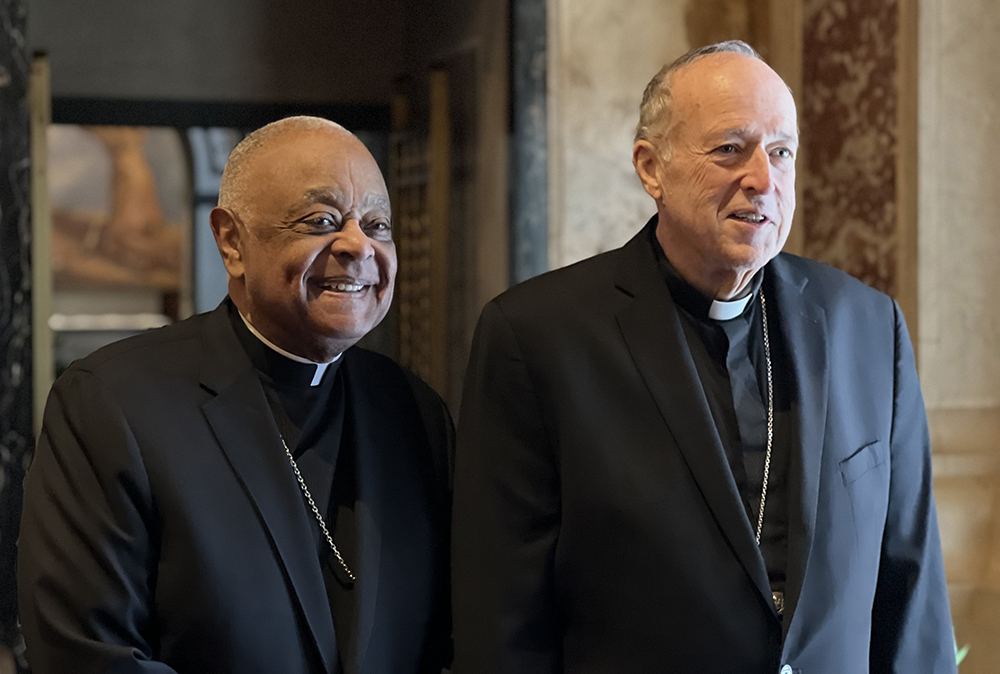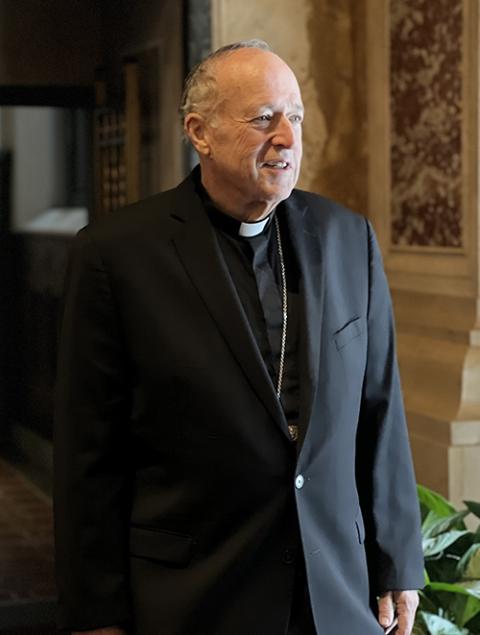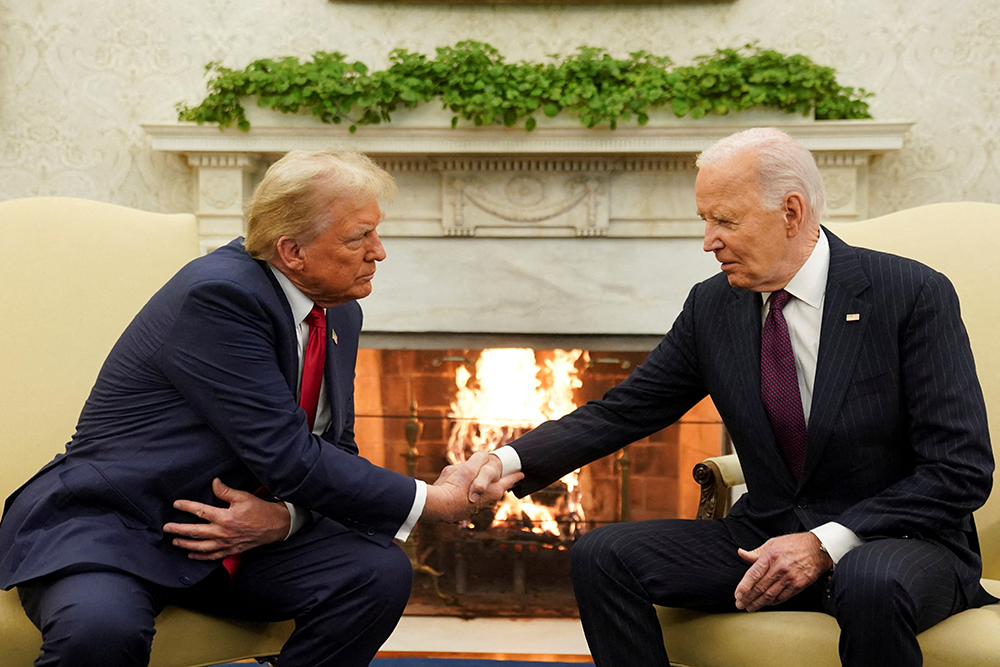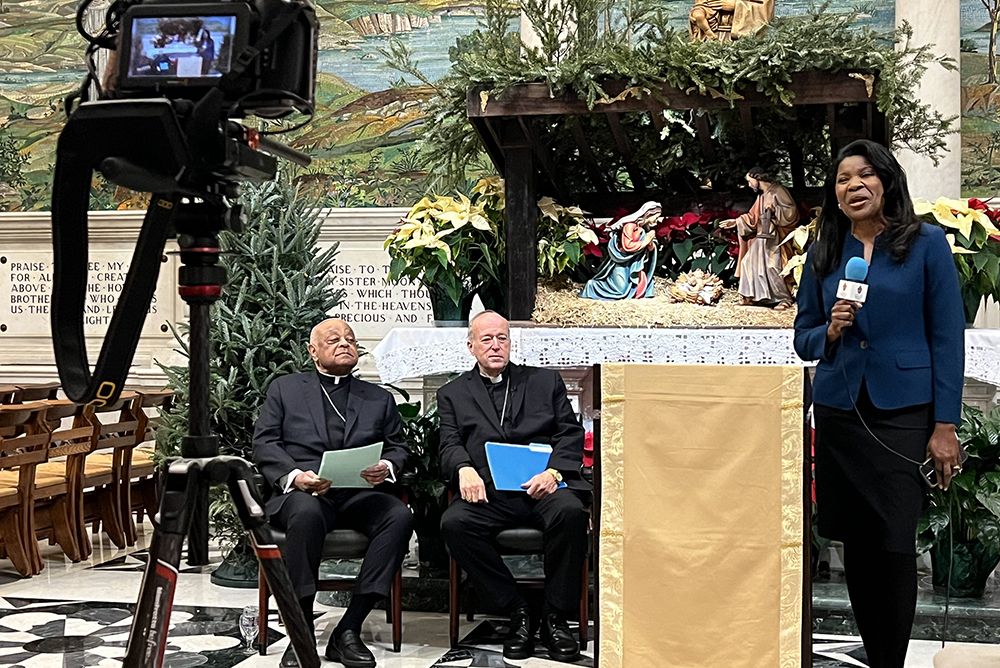
Washington Cardinal Wilton Gregory and Cardinal Robert McElroy leave a Jan. 6, 2025, news conference at the Cathedral of St. Matthew the Apostle in Washington. (OSV News/Archdiocese of Washington/Geoff Ros)
Two weeks before Donald Trump returns to the White House, Cardinal Robert McElroy of San Diego was introduced as the next archbishop of Washington, D.C. during a press conference Jan. 6 in a side chapel at St. Matthew's Cathedral.
McElroy, 70, seen as a leading liberal voice in the U.S. Catholic hierarchy, expressed gratitude for the appointment, spoke of synodality as "forging a template for deepening communion," and commended the local Catholic community for being "truly sacramental in the rich diversity of its traditions and perspectives on key issues in the life of the church and the world."
The cardinal from California stepped to a podium in front of a nativity creche in the St. Anthony de Padua Chapel as snow piled up outside of the historic cathedral. At his March 11 installation, McElroy, a Trump critic, is set to face potentially frosty relations with the White House and financial troubles in the archdiocese following the pandemic and a sexual abuse crisis.
Advertisement
That McElroy's appointment was announced during a heightened moment of political transition for the United States — the same day that Trump's election to president was certified by the U.S. Congress — was seen by some observers as a signal that the Vatican is paying close attention to current events in the nation's capital.
"I think the Vatican wants this kind of church leader to be the archbishop of Washington right now when Trump is about to take office, threatening to deliver on his promises on the deportation of immigrants. That's very important," said Massimo Faggioli, a theologian and church historian at Villanova University.
Faggioli told the National Catholic Reporter that McElroy's is "one of the most consequential appointments" in Pope Francis' pontificate. He said "a more cautious Vatican" would likely not have chosen McElroy to lead one of the country's prominent archdioceses.

Cardinal Robert McElroy leaves a Jan. 6, 2025, news conference at the Cathedral of St. Matthew the Apostle in Washington. (OSV News/Archdiocese of Washington/Geoffrey Ros)
"Many of us thought he was too progressive to be the archbishop of Washington, D.C., and that appointing him to the nation's capital was going to be too bold, too strong a statement, because he is far more progressive than the center of the [U.S. Conference of Catholic Bishops] on gay rights, synodality, immigrants, on almost anything," Faggioli said.
McElroy's calls for "radical inclusion" in the church, including for LGBTQ persons and divorced and remarried Catholics, has at times elicited anger among conservative Catholics; one bishop in 2023 appeared to suggest he was a heretic.
News of McElroy's appointment to Washington prompted pointed criticisms from conservative voices on social media. Bishop Joseph Strickland — the firebrand prelate who was removed from his east Texas diocese by Pope Francis in 2023 — went so far on X as to call McElroy "corrupt" and a "McCarrick clone."
However, McElroy's pastoral approach and public remarks have garnered appreciation from groups like New Ways Ministry, which advocates for LGBTQ Catholics.
"We are confident that Cardinal McElroy can provide a strong Catholic voice affirming the human dignity of LGBTQ+ people and the need for laws that will protect them," New Ways Ministry said in a Jan. 6 statement.
Meanwhile, Arlington, Virginia, Bishop Michael Burbidge issued a prepared statement where he said he looked forward to collaborating with McElroy as "a brother bishop and neighbor."
"Cardinal McElroy's arrival as Archbishop of Washington in the Holy Year 2025 is an opportunity to implore God's grace to strengthen all of us in the virtue of hope, and renew our commitment to be witnesses and messengers of hope for our nation and all our brothers and sisters, especially those in need," Burbidge said.
"I think the Vatican wants this kind of church leader to be the archbishop of Washington right now when Trump is about to take office, threatening to deliver on his promises on the deportation of immigrants."
— Massimo Faggioli
Patricia McGuire, president of Trinity Washington University, told NCR that she believes McElroy is "the right bishop at the right time for Washington, D.C." to replace retiring Washington Archbishop Cardinal Wilton Gregory.
"Cardinal Gregory has been wonderful and very pastoral, but with the second incoming Trump administration we need someone of the strength and vitality of Cardinal McElroy and his particular clarity on the immigration issue, which is so urgent right now," McGuire said.
At the Jan. 6 press conference, McElroy struck a conciliatory tone when asked about his plans to deal with Capitol Hill and the incoming Trump administration. He spoke of participating on a recent panel with other bishops who discussed ways to cultivate unity and overcome polarization.
"All of us as Americans should hope and pray that the government of our nation is successful in helping to enhance our society, our culture, our life, and the whole of our nation. That is my prayer," McElroy said.
A native of San Francisco, McElroy took a moment to speak in Spanish to Hispanic Catholics without referring to his prepared notes. He said that the Catholic Church is "the mother of all, especially in difficult times and in moments of suffering."
In his prepared remarks, he touched on recent immigration debates.
"The Catholic Church teaches that a country has a right to control its borders and our nation's desire to do that is a legitimate effort," he said. "At the same time we are called to have a sense of the dignity of every human person."

U.S. President Joe Biden meets with President-elect Donald Trump in the Oval Office at the White House in Washington Nov. 13, 2024. (OSV News/Reuters/Kevin Lamarque)
McElroy added that an indiscriminate mass deportation program of undocumented immigrants — which Trump has repeatedly promised — would be "incompatible with Catholic doctrine," though he said that "we'll have to wait and see" exactly what the Trump administration does on that front in the coming weeks and months.
That McElroy staked out that position on immigration enforcement was a sign for McGuire that the new archbishop will be "a very strong voice to counter the horrors that the Trump administration says it is planning to do."
"Cardinal McElroy has taken the right position, that [immigration] is one of the life issues for the church," McGuire said. "He's done a wonderful job reminding people that being pro-life is not just about being against abortion."
Besides stepping into a position where he will be expected by some to be a leading voice of public conscience in the Trump era, McElroy will take the helm of an archdiocese still recovering in some ways from revelations that one of his predecessors, former Cardinal Theodore McCarrick, sexually abused minors and seminarians with near impunity for decades.
A Dec. 3 pastoral letter written to parishioners and the finance committee at St. Mary Mother of God Parish in Washington, D.C., reported that the archdiocese has run an annual deficit of $10 million since McCarrick's behavior came to light in 2018. The letter, reviewed by NCR, said Gregory took steps to close that deficit, by implementing budget cuts in the archdiocese, installing a new assessment system of local parishes, and jump-starting the archdiocesan annual appeal "on better footing."
"All of us as Americans should hope and pray that the government of our nation is successful in helping to enhance our society, our culture, our life, and the whole of our nation. That is my prayer."
— Cardinal Robert McElroy
Gregory, speaking to reporters after the news conference announcing his resignation, acknowledged that the McCarrick revelations broke a trust that hurt donations to the church. "It takes a long time to establish trust," Gregory said. "It only takes a moment to break it."
But Gregory also said that an even larger factor was shutting down churches during COVID-19 pandemic. "It clearly threw a wrench into archdiocesan finances," Gregory said.
Charitable contributions might have fled the archdiocese, but overall giving is not down — just shifted, Gregory said. "People have shifted their giving patterns," the cardinal said. "Catholic Charities is booming."
McGuire said she knew that "many Catholics" in the archdiocese became "disengaged" from the local church because of McCarrick, who in 2019 was removed from the clerical state after the Vatican found him guilty of "solicitation in the sacrament of confession and sins against the Sixth Commandment with minors and with adults, with the aggravating factor of the abuse of power."
McCarrick's immediate successor, Cardinal Donald Wuerl, resigned from office in 2018 amid public criticisms sparked by a Pennsylvania grand jury report that year that questioned his handling of abusive priests in the early 1990s.

Paula Gwynn Grant, communications secretary for the Archdiocese of Washington, speaks at the beginning of a Jan. 6, 2025, press conference at the Cathedral of St. Matthew the Apostle in Washington, where Cardinal Wilton Gregory, at left, and Cardinal Robert McElroy, center, spoke. (OSV News/Archdiocese of Washington/Geoffrey Ros)
In 2019, Gregory took the helm of the Washington Archdiocese, where he led with a pastoral touch though he at times also generated headlines. In June 2020, he criticized Trump's visit to St. John Paul II National Shrine, adding that he found it baffling that any "Catholic facility would allow itself to be so egregiously misused and manipulated in a fashion that violates our religious principles." In April 2024, Gregory called President Joe Biden "a cafeteria Catholic" during an appearance on a national Sunday morning news program.
During the Jan. 6 press conference, Gregory said he intends to live in Washington, D.C. after McElroy's installation Mass, adding that he never saw the nation's capital as a "pass-through." Gregory added that he will be available "to the best of my ability."
In his prepared remarks at the press conference, McElroy spoke of a local church that had known "mountaintop moments" — most notably the visits of St. John Paul II, Popes Benedict XVI and Francis — but also "moments of failure and shame." He mentioned the "massive betrayal of the young to sexual abuse," as well as the "moral and financial reckoning for this betrayal which lie ahead for us."
As far as his vision for the Washington Archdiocese, McElroy said developing one will "have to be a truly collaborative effort if it is to guide us through the challenges we now face and help us to seize the opportunities for pastoral growth that lie within our midst."
McElroy added: "And it will have to be an effort continuously rooted in the risen Lord who is our hope and our strength."







